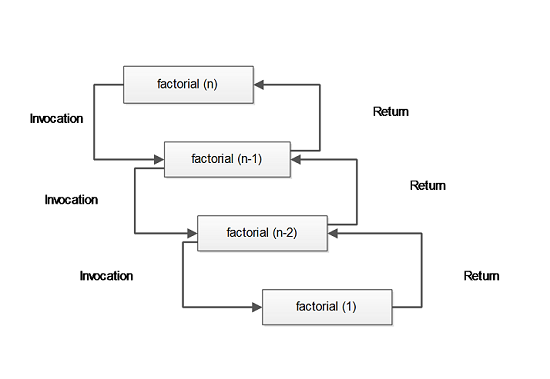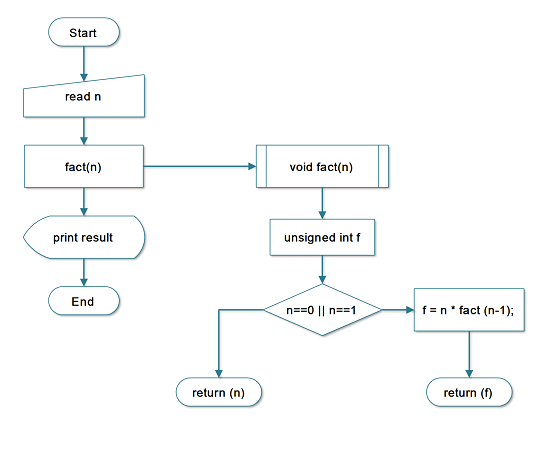The program to compute factorial calls a function recursively to compute the output.The recursion is the ability of a computing procedure to call itself repeatedly until the problem is solved.
We compiled the program using Dev C++ version 5 (beta) compiler installed on Windows 7 64-bit system. You can use any standard C compiler, but make sure to change the source code according to compiler specifications.
You must know the following c programming concepts before trying the example program.
- C Arithmetic Operators
- C Reading Input Values
- C Variables and Constants
- C Flow Control Structures
- C Functions
Problem Definition
In simple words, the factorial of a given number n is the product of all the numbers up to that number, including the number.
So factorial of ![]() is
is ![]()
In the previous section, we introduced you to the concept of recursion. To elaborate on that see the example below. If ![]() is a function then,
is a function then,

Every time factorial function calls itself, it reduces 1 from the parameter of the function until the ![]() is reached. Then it starts processing or working from
is reached. Then it starts processing or working from ![]() to the top –
to the top – ![]() and prints the final results.
and prints the final results.
Flowchart – Factorial with Recursion

Program Code – Factorial with Recursion
/*Program to compute Nth factorial */
#include < stdio.h >
#include < stdlib.h >
int fact (int n)
{
unsigned int f;
if ((n == 0) || (n == 1))
return (n);
else
/* Compute factorial by Recursive calls */
f = n * fact (n - 1);
return (f);
}
main ()
{
int i, n;
/* Reading the number */
printf ("Enter the Number :");
scanf ("%d", & n);
/* Printing results */
for (i = 0; i < 30; i++)
printf ("_");printf ("\n\n");
printf ("Factorial of Number %d is %d\n", n, fact (n));
for (i = 0; i < 30; i++)
printf ("_");printf ("\n\n");
system ("PAUSE");
return 0;
}The most important line of code in the above source code is following.
f = n * fact(n-1);The n is the current number being multiplied and function ![]() calls the previous number and this process continues till 1 reached. Then, the actual multiplication starts from
calls the previous number and this process continues till 1 reached. Then, the actual multiplication starts from ![]() up to
up to ![]() processing all numbers and resulting in final output.
processing all numbers and resulting in final output.
Output
Enter the Number:5
_______________________________
Factorial of Number 5 is 120
_______________________________